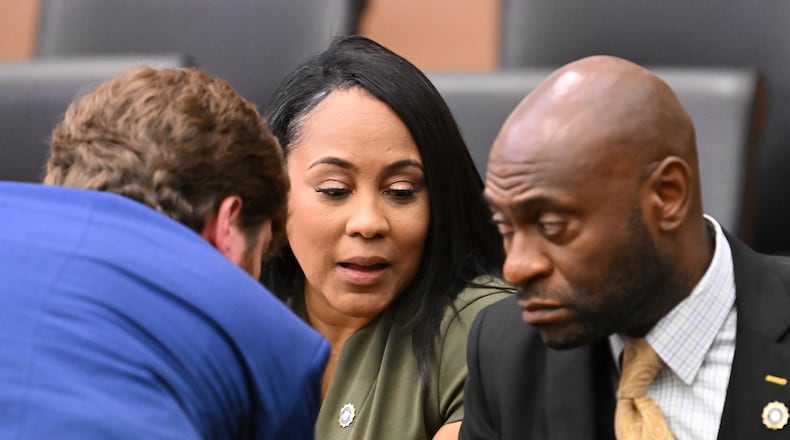Nathan Wade, part of the coosome twosome who led the prosecution against former President Donald Trump, said something in a recent interview that certainly rang true.
“Workplace romances are as American as apple pie. It happens to everyone,” he told an ABC interviewer. “But it happened to the two of us.”
The “us,” of course, was he and Fulton County District Attorney Fani Willis, with whom he was once romantically linked.
Wade’s contention of office romances hits home — I’m living proof. My parents met while working in an office. Where people get together, there will be attraction. Although the advent of HR departments has put a kibosh on some of that.
Wade was hired by Willis to lead the big case but exited after Fulton Judge Scott McAfee noted in a ruling that their past relationship posed “a perceived conflict in the reasonable eyes of the public (that) threatens confidence in the legal system itself.”
The explosive revelations derailed the case for a couple of months and has dented Madam DA’s credibility, even with supporters. (Although she will, no doubt, roll to election victory this year, even as GOP senators are taking a whack at her with a follow up investigation.)
McAfee ruled there wasn’t enough evidence to prove a quid-pro-quo situation where Wade was getting paid and then springing for the trips he and Willis took together. The two testified in hearings she repaid him for their travels in cash, an explanation that the judge noted “was not so incredible as to be inherently unbelievable.”
A pretty low legal bar.
The Georgia Court of Appeals on Wednesday agreed to take up an appeal of McAfee’s ruling, meaning that Willis still could get removed from the case. This also pretty much means the case won’t be heard until sometime after the election.
Also in question during the February hearings into the affair was how long Willis and Wade were an item. Was it before November 2021, as alleged by a Trump codefendant. Or early in 2022, as Willis and Wade testified. The point was, did Willis hire her boyfriend to what became a $725,000 legal fee motherload?
Willis’ team contended a pack of lies were directed at her and Wade. McAfee said he he was “unable to place any stock in the testimony of Terrence Bradley,” the supposed “star” witness against Wade and Willis.
In the end, McAfee threw up his hands and made a compromise decision allowing Willis to continue on with the case. You can tell he was holding his nose as he typed out his decision saying “an odor of mendacity remains.”
“The Court is not under an obligation to ferret out every instance of potential dishonesty from each witness or defendant ever presented in open court,” he wrote. “Such an expectation would mean an end to the efficient disposition of criminal and civil proceedings.
“Yet reasonable questions about whether the District Attorney and her hand-selected lead (special prosecutor) testified untruthfully about the timing of their relationship further underpin the finding of an appearance of impropriety and the need to make proportional efforts to cure it,” he continued.
Credit: TNS
Credit: TNS
Having “reasonable questions” as to whether the DA of Georgia’s biggest county was telling the truth under oath is a big deal.
Willis’ spokesman said they would have no comment for this column.
It’s also notable that the rookie judge sounded world-weary (or at least realistic) when he noted that judges can’t be ferreting out every lie or half truth in a case or nothing could ever get done.
“I think what he’s saying is that it doesn’t matter if a person is lying, this is my decision,” said Randy Kessler, an Atlanta divorce lawyer, who has heard a fib or two in his decades of practice. “Just because he didn’t kick her off doesn’t mean he believed everything they said. It was a spoonful of sugar (decision).”
Not telling the truth in court — the whole truth and nothing but the truth — probably occurs in every case. After all, you are in court with alternating views of reality.
“There’s a difference of opinion and both sides can’t be right,” said Jack Martin, a retired criminal defense attorney. “You can’t put up a witness you know is lying. But it’s not up to you who’s telling the truth or not. It’s up to the jury to decide who’s telling more truth than the other.”
Or, in this case, the judge.
“I agreed with Judge McAfee,” Martin said. “You’re not going after every little lie; you’re going after the truth.”
Senior Fulton Superior Court Judge Wendy Shoob sat on the bench for 24 years and said people were lying, or shading the truth, “all the time.”
“If you’re faced with prison or the loss of career, you can expect people to lie,” she said. “It’s often the case that testimony might be a mixture of facts and lies. You’re trying to get to the ultimate truth.”
In this case, she said, Judge McAfee’s “job was to get to the heart of it,” meaning he had to decide whether Willis could try the case without a huge conflict of interest.
Ultimately, McAfee determined Willis could be fair, no matter what he thought of her — and Wade’s — testimony.
”It gets down to, can you believe the witness,” Shoob said. “You don’t have to completely disregard a witness that you think might have lied.”
And so, DA Willis remains to carry her fight to Trump.
“We talk about a verdict that speaks the truth, and that’s what I expect,” Wade told ABC.
I suppose that was the “ultimate truth” Judge Shoob was speaking about.
About the Author
Keep Reading
The Latest
Featured





